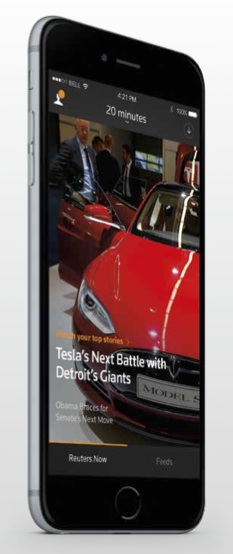Secure your place at the Digiday Publishing Summit in Vail, March 23-25

With Reuters TV, a smart video app for news junkies, Reuters is once again trying to establish itself as a consumer brand.
The news giant unveiled Reuters TV at a Monday night soiree in its Times Square headquarters. Scheduled to launch in January on iPhone and iPad, Reuters TV aims to generate a relevant viewing experience for each subscriber. An algorithm pulls from a well of videos produced specifically for Reuters TV, assembling them into a coherent news show that considers viewers’ location, usage data and available time as well as the editorial value of each story.
“It’s a reinvention of some of the fundamental aspects of TV news,” said Isaac Showman, managing director of Reuters TV. “We’re moving away from mass broadcasts to one that’s relevant for every single user.”
Every Reuters TV segment comes in short, medium and long variations, so a subscriber who queues up a 20-minute broadcast will see more in-depth videos than someone who asks for a five-minute one (options range from 5 to 30 minutes). Past app usage and location also matter: A viewer in London is likely to receive a longer report on the U.K. prime minister than a New York subscriber, for example. Reuters TV will also offer live streams of major news events, like presidential addresses and protests.
Reuters has hundreds of video crews around the world who already produce around 100,000 video stories annually, according to the company. The organization will leverage those resources as well as new production facilities in New York, London and Hong Kong to create reports for Reuters TV, which will range from politics and finance to sports and pop culture.
“Our business, fundamentally, is about leveraging our extraordinary scale,” said Showman.
Reuters TV comes after a string of digital missteps at Reuters, most notably Reuters Next, an ambitious reworking of the news agency’s Web presence. In September 2013, after two years of development, Reuters CEO Andrew Rashbass pulled the plug on that project. It was a long way from achieving commercial viability or strategic success, he said.
“We need to focus on our unique photography and video to win in an increasingly visual media world,” Rashbass wrote in a memo to employees at the time.
 Reuters TV has been in the works for just over a year, with development beginning just after Rashbass shuttered Reuters Next. Unlike Reuters Next, the new app has a clear business model: Reuters TV costs $2 a month and will also serve video ads.
Reuters TV has been in the works for just over a year, with development beginning just after Rashbass shuttered Reuters Next. Unlike Reuters Next, the new app has a clear business model: Reuters TV costs $2 a month and will also serve video ads.
“We think a lot about sustainability,” said Showman. “Having multiple sources of revenue is a great way to protect journalistic sustainability.”
Reuters is targeting 30- to 40-year-old “realists” who “need to be in the know,” according to the company’s marketing materials. But with an abundance of free news video, it’ll be challenging for Reuters to build up a sizable subscriber base, said Bernard Gershon, president of digital media consultancy GershonMedia.
“I would be stunned if they had more than 20,000 paying subscribers at the end of year one,” said Gershon. “There’s something to be said for creating more of a Netflix-like recommendation engine experience for high-quality news video, but I’m just not convinced that’s enough of a differentiator that it’s a high-quality news business. … If this were a startup looking to raise money, they’d get laughed out of the room.”
Reuters has yet to secure deals with any brand advertisers, as it has just begun to pitch the product, said Showman. The ad load will be limited, he said, “a fraction of traditional television advertising.” At launch, Reuters TV will not leverage user data to target ads more effectively, as the app does with Reuters’ editorial content.
“We’ll look at the appropriate uses of data while keeping in mind that we take a great pride in protecting users’ privacy,” said Showman.
Eventually, Reuters TV will expand beyond iOS devices to other mobile gadgets and connected TV devices, said Showman. But across all platforms, Reuters envisions a similar experience, one where the consumer can relax, lean back and consume.
“You’re going to get a really personal, one-on-one relationship with the journalists on the ground,” said Showman. “But you won’t have to make a lot of choices.”
More in Media

WTF is a creator capital market?
What is a creator capital market, what does it mean for creators looking to diversify revenue, and why is it so closely tied to crypto?

Media Briefing: Publishers explore selling AI visibility know-how to brands
Publishers are seeing an opportunity to sell their AI citation playbooks as a product to brand clients, to monetize their GEO insights.

Creators eye Snapchat as a reliable income alternative to TikTok and YouTube
Figuring out the Snapchat formula has been very lucrative for creators looking for more consistent revenue on a less-saturated platform.





